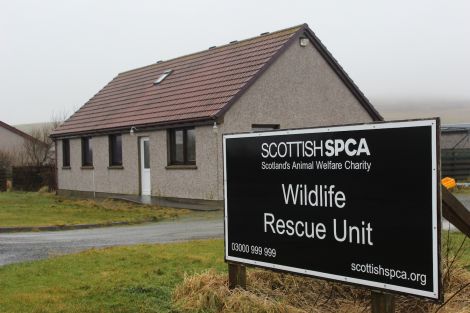News / Alarm at plans to close isles’ SSPCA unit
WILDLIFE interests in Shetland have reacted with shock at plans by the Scottish SPCA to close its wildlife rescue unit in the isles.
The animal welfare charity said that it must close the facility to focus all its resources on its new £3.5 million wildlife rescue unit which opened last year at Fishcross, in Clackmannanshire.
The wildlife unit in Gott was built in 1993 with the help of a £90,000 donation from energy company BP in the wake of the Braer oil spill disaster.
It plays a key role in Shetland’s response plans should there ever be another pollution incident around the isles, providing facilities where birds can be pre-washed before being sent to the Scottish mainland.
Over the past two decades it has come to be relied upon by local people when they find sick, injured or abandoned wildlife in the isles.
It has also provided a haven for birds that have been stranded on offshore oil platforms, including a snowy owl, a gyr falcon and four ospreys.
The news of the impending closure has alarmed local birding interests and the local seal and otter sanctuary, which has worked closely with the SSPCA.
Hillswick Wildlife Sanctuary owner Jan Bevington said: “I am completely astounded that they should even be thinking about doing this considering the state of wildlife in Shetland at the moment, especially the seabirds, who need all the help they can get.
“This is a small unit that can’t cost much to run and was mostly paid for by BP in the aftermath of the Braer should there ever be another oil spill, God forbid.
“It has a big car park where facilities can be expanded in the event of a major incident.
“The loss of this unit is going to considerably undermine Shetland’s ability to cope should such an event ever happen, with all the offshore activity going on and the extreme weather we are having.”
Become a member of Shetland News
Shetland Bird Club chairman Gary Bell added: “The bird club would be apprehensive about any changes that may take place at the Gott facility, both in terms of the day to day care of wild birds and its role as a primary response in dealing with an oil spill situation.”
SSPCA chief superintendent Mike Flynn said the charity would continue to rescue animals in the islands, but they needed to use their resources as effectively as possible.
“In 2012 we opened our National Wildlife Rescue Centre in Clackmannanshire, investing £3.5 million and developing dedicated facilities to care for and rehabilitate sick and injured wild animals prior to their release,” he said.
“The centre, which also has specialist facilities to treat up to 1,000 oiled bird casualties at any one time and benefits from on-site veterinary expertise, can take in thousands of wild animals every year and receives casualties from throughout Scotland, including the Scottish islands.
“It is vital that we use the donations we receive as effectively as possible and that we consider what is in the best interests of animal welfare. “We are currently reviewing the facilities we need on Shetland, where we currently have a small wildlife unit.
“The local population can be assured that we will continue to rescue animals in the area.”
Become a member of Shetland News
Shetland News is asking its many readers to consider paying for membership to get additional features and services: -
- Remove non-local ads;
- Bookmark posts to read later;
- Exclusive curated weekly newsletter;
- Hide membership messages;
- Comments open for discussion.
If you appreciate what we do and feel strongly about impartial local journalism, then please become a member of Shetland News by either making a single payment, or setting up a monthly, quarterly or yearly subscription.




























































